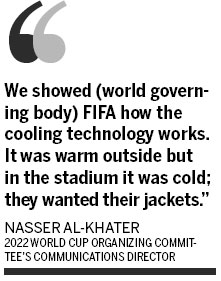Qatar races to develop solar-powered cooling
Updated: 2013-04-20 07:19
By Reuters in Berlin (China Daily)
|
|||||||||||
Qatar is racing to develop efficient solar-powered cooling technology to counter the searing heat of the Middle Eastern summer in its stadiums during the 2022 soccer World Cup, a senior organizing committee official said.
Nasser Al-Khater, the organizing committee's communications and marketing director, also said the tiny gulf state would construct its stadiums with modular technology so it could downscale them after the tournament, and donate seating to countries with little sports infrastructure.
Al-Khater said the wealthy emirate already boasted the world's first cooled stadium, albeit with traditional energy sources. Temperatures in Qatar can reach more than 40 C in the summer months.
"We showed (world governing body) FIFA how the cooling technology works. It was warm outside, but in the stadium it was cold; they wanted their jackets," Al-Khater said during a trip to Berlin for a Qatari business and investment conference.
"So cooling a stadium is not the issue."
The issue is that Qatar has promised to hold a carbon-neutral World Cup and is researching solar-powered cooling technology. It will either create a central solar power farm or have individual ones installed in each of the 12 stadiums it is building, Al-Khater said.
"When you don't use it for the stadiums, you feed it into the grid," he said.

The emirate developed a small, solar-powered prototype stadium seating 500 during the bid process, but wants to develop more efficient technologies ahead of 2022.
"With solar, the big challenge is how do you deal with solar technology in the desert in terms of withstanding the elements and getting it clean so it is efficient," Al-Khater said.
He said he had met several German companies during his trip to Berlin that had interesting proposals. Germany has been a pioneer in solar technology.
Many leading voices in football such as UEFA president Michel Platini have called for the World Cup to be held in December or January, when the average temperature is 17 degrees, rather than in the middle of the year.
Historically, the World Cup has always been held in June and July and any change could lead to a major scheduling headache with the major European leagues normally playing through the winter. Qatar's right to stage the 2022 World Cup if the event is moved to the winter months would also be open to a legal challenge.
Al-Khater said Qatar would go ahead researching and installing the cooling technology either way as the stadiums would be used in the summer months even after the World Cup.
"Whether it is a winter or summer World Cup we will be ready," he said.
Al-Khater said Qatar, a tiny country home to 1.7 million inhabitants, was using modular seating for the upper tiers of its new stadiums in order to be able to downsize after the World Cup. "The idea is we will contribute the seats to countries that need to develop their sporting infrastructure."
He said it was too early to discuss whether or not alcohol, which is legal in Qatar albeit under restrictions, would be allowed in the stadiums.
"One thing we want people to know is alcohol is not part of our culture," he said. "And every World Cup you go to, people experience the local culture, its differences and similarities."
(China Daily 04/20/2013 page23)
Today's Top News
Live report: Hundreds feared dead or injured in M7.0 Sichuan quake
Boston suspect cornered on boat
H7N9 flu transmission studied
8% growth predicted for Q2
Nuke reactor gets foreign contract
First couple on Time's list of most influential
'Green' awareness levels drop in Beijing
Palace Museum spruces up
Hot Topics
Lunar probe , China growth forecasts, Emission rules get tougher, China seen through 'colored lens', International board,
Editor's Picks

|

|

|

|

|

|





